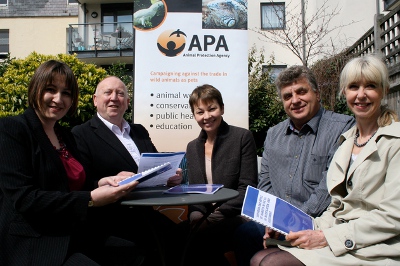

A new independent scientific report, released today, has resulted in calls for an EU-wide ban on exotic pet markets to protect animal welfare, public health and biodiversity. The report, commissioned by the Animal Protection Agency, International Animal Rescue, Eurogroup for Animals and other European animal protection groups, was this week presented to Caroline Lucas MP and Keith Taylor MEP.
Scientists investigated amphibian and reptile markets across Europe and carried out onsite inspections of key events in the UK, Germany and Spain. In the UK, scientists visited the Doncaster Dome on 18 September 2011. Stress-related behaviours were commonly observed in the animals and the report described the conditions and treatment of the vast majority of amphibians and reptiles as ‘tantamount to animal abuse’. It was noted that veterinarians charged with inspecting the animals had failed to identify systematic welfare problems.
The report also highlighted the health risks to attendees. Reptiles and amphibians typically carry germs that contaminate their general environment and, within a short period of time, probably spread to humans with a potential of causing infections. Also, of concern was the risk involved in subsequently hiring out venues contaminated by reptile and amphibian events for a variety other purposes, including activities involving children.
Says Caroline Lucas MP:
“Since selling pets in the street and markets was banned in 1983, so much has been done by local councils, animal welfare groups and the courts to almost eradicate the practice. Yet animal sellers have tried numerous tactics in their attempts to continue their trade, and a handful of councils have yet to recognise and take action to stop commercial animal trading disguised as an innocent hobby. This is why urgent action is needed now.”
Says Keith Taylor MEP:
“Selling wild animals in bad conditions on market stalls is both inhumane and unnecessary. It is bad for the animals, who frequently show signs of stress, and also bad for human health. Non-native species are becoming a major environmental concern and exotic pet markets can only add to this problem. It is crucial that the European Commission takes action to tackle this issue.”
Another important finding of the study was that these markets provide a key route for exotic amphibians and reptiles (captive-bred, as well as wild-caught) to spread throughout the EU and impact on local ecosystems - at great cost to EU economies. The report will be presented to the European Commission, which is currently considering measures to address Invasive Alien Species.
The report is available to download from www.apa.org.uk and www.internationalanimalrescue.org
In the UK, the sale of pet animals at markets was outlawed in a 1983 amendment to the Pet Animals Act 1951, which states that:
“If any person carries on a business of selling animals as pets in any part of a street or public place, or at a stall or barrow in a market, he shall be guilty of an offence.”
Many pet traders who operate at markets claim that their business is legitimate because they describe themselves as ‘hobbyists’. However, selling animals on a repeated basis constitutes carrying on a business by way of ‘degree of repetition’, in law. According to the report authors, “most sellers were commercial traders whether or not their activities were declared or formalised.”
The following reptile and amphibian markets are planned to take place this year:
The report Amphibian and Reptile Pet Markets in the EU: An Investigation and Assessment’ was sponsored by: The Animal Protection Agency (UK), Animal Public (Germany), Eurogroup for Animals (Belgium), Eurogroup for Wildlife and Laboratory Animals (Belgium), Fundacion para la Adopcion, el Apadrinamiento y la Defensa de los Animales (Spain), International Animal Rescue (UK) and People for the Ethical Treatment of Animals (Germany).
Details of report authors are as follows: